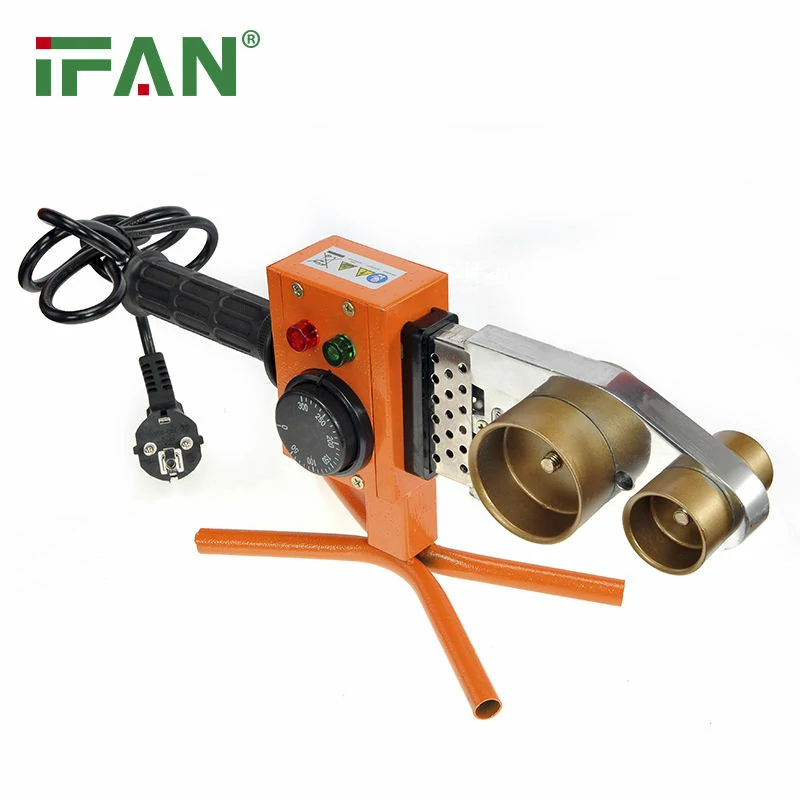Understanding NBR 15884 Standards and PPR Welding Technology
PPR welding machines compliant with NBR 15884 standards represent the gold standard in Brazilian pipeline installation. These machines ensure reliable connections for polypropylene random copolymer pipes. The NBR 15884 specification defines precise temperature control, heating time, and cooling requirements.
Factory customization enhances machine performance for specific applications. Custom features address unique project demands. Professional installers require equipment that meets exact specifications.
Key Features of NBR 15884 Compliant PPR Welding Machines
Temperature Control Systems
Advanced digital displays maintain consistent heating temperatures. Precision thermostats prevent overheating damage. Temperature ranges typically span 200°C to 300°C for optimal fusion.
Heating Plate Design
Mirror-polished aluminum plates distribute heat evenly. PTFE coating prevents pipe material adhesion. Interchangeable plates accommodate various pipe diameters from 20mm to 110mm.
Safety Features
Automatic shutdown systems prevent accidents. LED indicators show operational status clearly. Ergonomic handles reduce operator fatigue during extended use.
Factory Customization Options for Professional Applications
Power Configuration
Standard 220V models suit most installations. 110V variants serve specific regional requirements. Industrial-grade 380V systems handle heavy-duty applications.
Heating Plate Combinations
Custom plate sets match project specifications. Specialized diameters serve unique pipeline systems. Quick-release mechanisms enable rapid plate changes.
Control System Upgrades
Digital timers ensure precise welding cycles. Audible alarms signal completion phases. Advanced models feature programmable temperature profiles.
Benefits of NBR 15884 Standard Compliance
Garantía de calidad
Certified machines guarantee reliable joint formation. Testing protocols validate welding strength. Quality standards reduce long-term maintenance costs.
Professional Credibility
NBR compliance demonstrates technical expertise. Certified equipment meets contractor requirements. Professional installations increase customer confidence.
Cumplimiento de la normativa
Brazilian construction projects mandate NBR 15884 adherence. Compliant equipment satisfies inspection requirements. Proper certification prevents project delays.
Technical Specifications and Performance Standards
Heating Time Requirements
20-32mm pipes require 5-8 seconds heating time. 40-63mm diameters need 12-18 seconds. Larger pipes demand proportionally longer heating cycles.
Cooling Time Standards
Natural cooling prevents joint stress. Minimum cooling time equals heating duration. Proper cooling ensures maximum joint strength.
Power Consumption
Efficient designs minimize energy usage. Power consumption varies by plate size. Typical consumption ranges from 800W to 2000W.

Applications in Modern Pipeline Systems
Fontanería residencial
Hot water systems benefit from reliable PPR connections. Cold water lines require precision welding. Heating systems demand temperature-resistant joints.
Commercial Projects
Large-diameter pipes serve commercial buildings. High-pressure applications require strong welds. Industrial installations need durable connections.
Infrastructure Development
Municipal water systems utilize PPR technology. Distribution networks require reliable joints. Service connections benefit from standardized procedures.
Selecting the Right Factory Customized Machine
Project Requirements Assessment
Pipe diameter range determines machine specifications. Installation volume affects capacity needs. Working environment influences durability requirements.
Customization Benefits
Tailored features improve work efficiency. Specific configurations reduce setup time. Custom accessories enhance versatility.
Long-term Investment Value
Quality machines provide years of service. Reliable equipment reduces replacement costs. Professional-grade tools maintain accuracy over time.
Quality Control and Manufacturing Standards
Factory Testing Procedures
Each machine undergoes rigorous testing. Temperature accuracy receives verification. Safety systems require functional validation.
Certification Process
NBR 15884 compliance requires documentation. Third-party testing validates performance. Quality certificates accompany each machine.
Warranty and Support
Comprehensive warranties protect investments. Technical support ensures proper operation. Spare parts availability guarantees longevity.
Installation and Operation Best Practices
Pre-operation Preparation
Clean pipe ends ensure proper fusion. Correct alignment prevents joint defects. Proper heating time prevents weak connections.
Welding Technique
Steady pressure creates strong joints. Even heating ensures uniform fusion. Proper cooling time allows joint solidification.
Maintenance Requirements
Regular cleaning maintains performance. Periodic calibration ensures accuracy. Proper storage extends equipment life.
Cost Considerations and Return on Investment
Initial Investment Analysis
Quality machines justify higher upfront costs. Reliable equipment reduces replacement expenses. Professional tools increase work efficiency.
Operating Cost Benefits
Energy-efficient designs reduce utility bills. Durable construction minimizes repair needs. Accurate temperature control prevents material waste.
Productivity Improvements
Fast heating cycles increase daily output. Reliable operation reduces downtime. Professional results satisfy customer expectations.
Future Trends in PPR Welding Technology
Digital Integration
Smart controls improve operation precision. Bluetooth connectivity enables remote monitoring. Data logging tracks performance metrics.
Consideraciones medioambientales
Energy-efficient designs reduce carbon footprint. Sustainable manufacturing practices gain importance. Recyclable materials support environmental goals.
Industry Evolution
Advanced materials require updated techniques. New standards drive technology development. Professional training adapts to innovations.
Choosing a Reliable Factory Partner
Manufacturing Expertise
Experienced factories understand market needs. Quality control systems ensure consistency. Technical knowledge supports customization requirements.
Service Capabilities
Comprehensive support includes training programs. Technical documentation aids proper operation. Responsive service maintains equipment performance.
Global Reach
International shipping serves worldwide markets. Local representatives provide regional support. Established distribution networks ensure availability.
Professional PPR welding requires reliable equipment. NBR 15884 compliance ensures quality results. Factory customization addresses specific needs. Investment in quality machines delivers long-term value.













Comentarios recientes